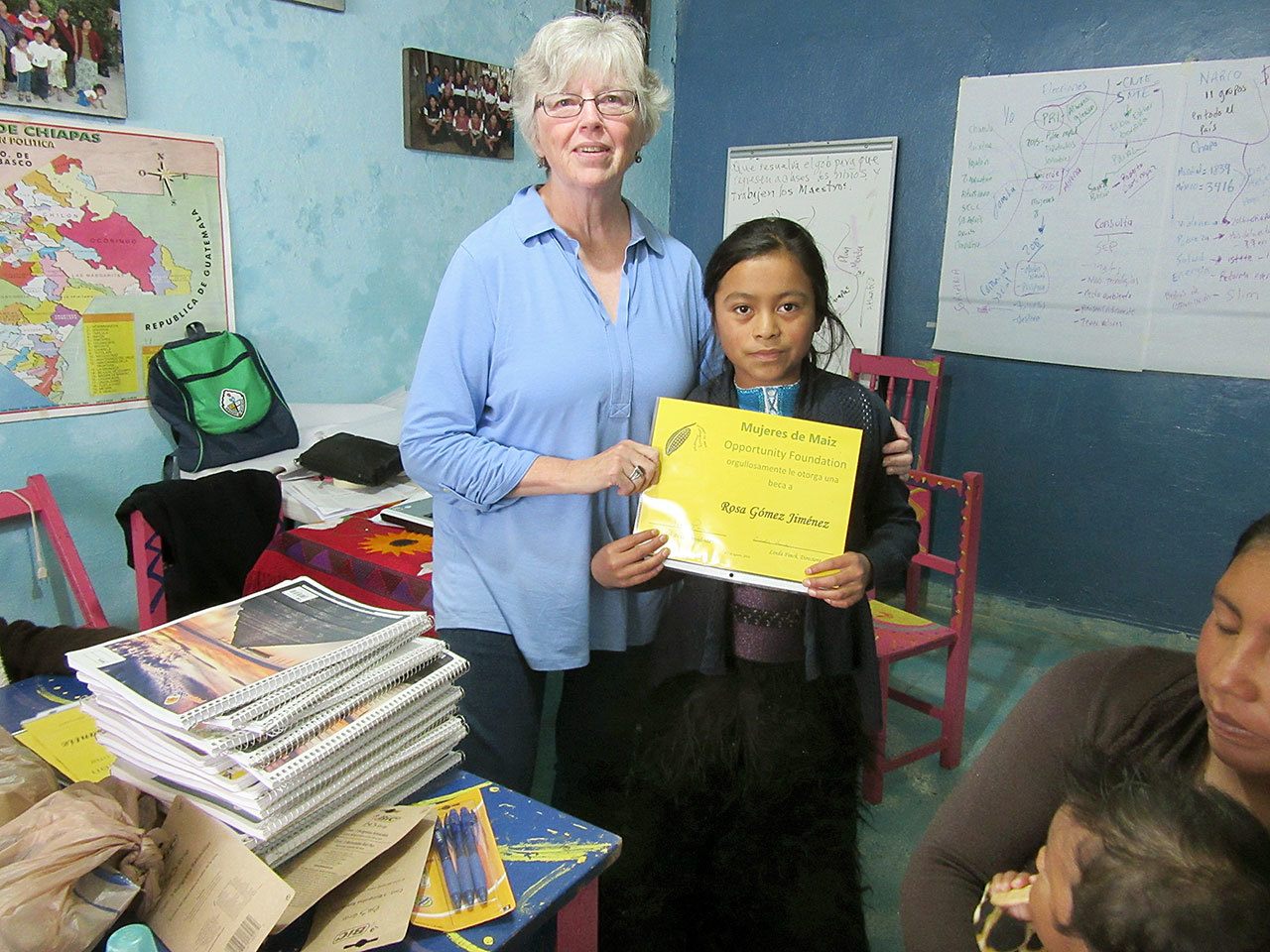SEQUIM — Twenty-two girls living in Chiapas, Mexico, are able to continue attending school and even college this year thanks to scholarships provided by the Mujeres de Maíz Opportunity Foundation of Clallam County.
To generate additional funding for the coming year, the nonprofit invites the public to the 11th annual Día de Muertos Dinner and Silent Auction — to begin at 5:30 p.m. Saturday at the Sequim Masonic Hall, 700 S. Fifth Ave.
The vegetarian dinner will include chips and salsa, Mexican squash casserole, ensalada de maíz (corn salad), beans, Mexican wedding cookies, hibiscus juice and Raven’s Brew coffee.
The dinner will be prepared by Molly Rivard and Steve Gilchrist, Mujeres de Maíz board members.
Beer and wine also are available at a no-host bar.
Music will be performed by José Franco.
Entry is by the suggested donation of $25 at the door. No advance tickets are available.
The auction has more than 70 unique items, including many hand-crafted in Mexico — some from women participating in the nonprofit’s programs, said Judith Pasco, Mujeres de Maíz Opportunity Foundation board chair.
Local offerings also are featured.
Mujeres de Maíz, translated as “Women of Corn,” is an organization based in Sequim. It was established about 11 years ago to provide access to education for young women in a seamstress cooperative centered in San Cristobal de las Casas, Chiapas, Mexico.
The ability to provide scholarships and other services to the underprivileged residents living in the southernmost state of Mexico is completely dependent upon donations and fundraising efforts including Saturday’s dinner, Pasco said.
“It’s a fun evening with a delicious dinner,” Pasco said.
“Our auction makes holiday shopping easy. We have something for everyone on your list, and the majority of what we auction is one-of-a-kind.”
This fundraiser is “by far” the largest and most important of the year for Mujeres de Maíz, Pasco said, adding that the fundraising goal is between $8,000 and $10,000.
“The money is used to fund scholarships for indigenous women and girls, children’s programs that are aimed to keep children in school after fifth grade, workshops, computers, an adult literacy program and eye exams and glasses,” Pasco said.
“Scholarships go to girls starting at sixth grade when education becomes too costly for the majority of indigenous families, and go all the way up to university level.”
There have been 43 scholarship recipients over the past 11 years, Pasco said.
“All but four have continued at least two years” in the program, she said.
“The average length of time on scholarship is four years. We have had three university graduates, and three more are currently in university.”
Scholarships are given to women and girls who confront sexism, racism and poverty on a daily basis, Pasco said.
Each recipient must provide community service in exchange for their scholarship.
“All scholarship recipients are required to give back at least 100 hours of community service to the cooperative each year,” she said.
“Many teach literacy to women in their communities, [while] some design and run the children’s programs.”
For the current school year, Mujeres de Maíz has awarded about $15,000 in scholarships, with another $12,300 allocated the year before, Pasco said.
Another $20,000 this year will fund other programs for the underprivileged residents in Chiapas, including children’s programs in four communities run by scholarship recipients, Pasco said.
The ultimate goal, Pasco said, is to help break the cycle of poverty, build self-esteem and create positive role models.
“We do not assume to know what is needed; the women we partner with know better than we do what they need,” she said.
“They propose and we listen, and if possible, we fund. Indigenous girls and women have had little power in their own lives for decisions. The traditional woman’s role is relegated to the household duties.”
If a family can afford to educate a child, Pasco said, “normally a son is chosen.”
As such, “we have participated in helping women to be educated, to find their voice, to value their opinions and to have power in determining the course of their lives,” Pasco said.
The services cause a positive ripple effect throughout the community.
“Women who attend workshops take the information home and share it with members of their communities,” she said.
Pasco last traveled to Chiapas in August, she said. She has been there more than 25 times.
“All travel to Chiapas by board members is paid by the board member,” she said.
“We use no donated funds for board travel. All board members are volunteers.”
During her most recent trip, Pasco said she “sat in on two very good workshops — one on herbal remedies, presented by an herbalist, and one on how to give self-breast exams.”
Pasco also visited two families in Zinacantan.
“It is always special to go out to communities and connect with the women and children there,” she said.
For more, visit www.mujeresdeMaízof.org.
________
Features Editor Chris McDaniel can be reached at 360-452-2345, ext. 56650, or at cmcdaniel@ peninsuladailynews.com.

